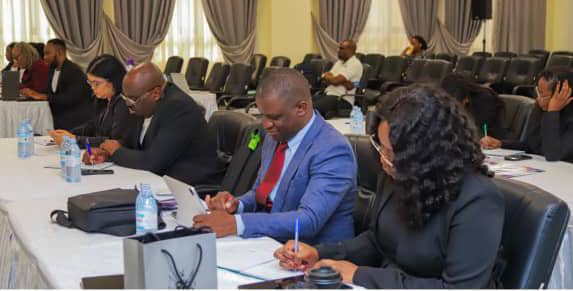Namibia Judiciary Benchmarks on Uganda's Electronic Case Management System

The Judiciary of Uganda has hosted a high-level delegation from Namibia for a two-day benchmarking visit focused on Electronic Court Case Management Information System (ECCMIS), a digital reform aimed at improving judicial efficiency and transparency.
The Namibian team, led by Deputy Chief Justice Petrus Damaseb, was received at the Supreme Court building by Justice Thomas Ocaya of the Commercial Court.
The visit, marks another milestone in regional judicial cooperation, particularly in embracing technology to enhance access to justice.
Justice Ocaya welcomed the 15-member delegation and urged them to engage actively with Uganda’s top ECCMIS team.
“This is your chance to learn everything about our ECCMIS system,” he said. “Be interactive, ask questions, and make the most of this opportunity.”
Drawing from his experience as one of the pioneer users in the Commercial Court, Justice Ocaya said the system is now fully functional there and its adoption is expanding to courts nationwide.
In his remarks Pius Bigirimana, Permanent Secretary and Secretary to the Judiciary emphasized the significance of cross-border learning.
“It is important to learn from each other to save time and money,” he said, highlighting the strategic value of such visits.
This is the first benchmarking delegation he has addressed since assuming his role as Chairperson of the Southern and Eastern Africa Judicial Administration Association (SEAJAA).
Dr. Bigirimana emphasized the need for full ownership of ECCMIS implementation by the judiciary. “If you don’t own it, you will be lost,” he cautioned.
He stressed that judicial officers are the system’s primary users, while IT personnel serve as enablers.
Drawing on Uganda’s own experience, he recalled initial skepticism from some lawyers, but noted that ECCMIS has since contributed to reduced corruption, greater transparency, and improved tax compliance.
He further advised the Namibian team to integrate ECCMIS into their national budget rather than relying heavily on donor support. “ECCMIS must be part of your national budget if you want it to succeed,” he said.
Representing Uganda’s Chief Registrar, Elizabeth Akullo welcomed the delegation and underlined the shared commitment to innovation in justice delivery.
“Your presence signifies our collective desire to advance justice through technology,” she noted, expressing optimism about stronger collaboration between the two judiciaries.
Mr. David Kikabi, Head of ICT at the Judiciary, gave a comprehensive presentation on Uganda’s ECCMIS journey, which began in 2022. He revealed that the law governing ECCMIS was officially gazetted in March 2025, allowing time for legal professionals and the public to align with the new digital system.
Kikabi also highlighted key lessons in system procurement, advising the Namibian team to ensure all deliverables are verified before approvals are granted.
He stressed that training remains a top priority, targeting both internal users such as judicial officers and external stakeholders including the legal fraternity and general public.
“We have hosted several countries before, and it’s encouraging to see successful implementations after these visits,” Kikabi said.
The Namibian delegation is expected to conclude their visit with a deeper understanding of ECCMIS implementation, stakeholder engagement, legal frameworks, and system sustainability—insights that could shape their own digital transformation agenda.



0 Comments